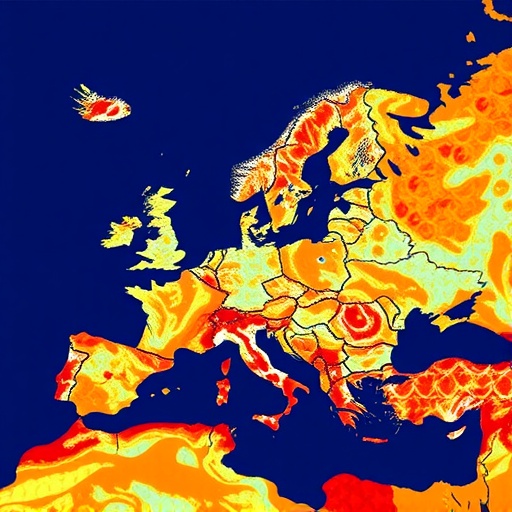In the rapidly evolving field of climate science, advanced modeling techniques are becoming ever more vital for accurate regional climate projections. A recent scholarly work by Loganathan, Zea, and Vinuesa introduces a groundbreaking deep-learning-based framework that not only ranks various climate models but also effectively downscales their projections for specific European climate zones. This innovative approach promises to refine our understanding of local climate dynamics, making it indispensable for policymakers and researchers alike.
Understanding climate projections has become crucial in an era marked by shifting weather patterns and escalating climate-related phenomena. Traditional climate models, while informative, often struggle to provide precise regional forecasts necessary for comprehensive climate adaptation strategies. By leveraging the power of deep learning, the authors tackle this challenge head-on, offering a fresh perspective on how these models can serve local needs more effectively.
One major limitation of standard climate models is their coarse spatial resolution, which often results in a lack of detail when applied to smaller regions. This shortfall can lead to inappropriate policy responses and adaptation measures that fail to account for localized climate vulnerabilities. The new framework introduced by Loganathan et al. addresses this crucial gap by integrating deep learning methodologies that refine and enhance the forecasts generated by existing climate models.
The authors begin by performing a systematic evaluation of multiple climate models, subsequently ranking them based on their predictive capabilities. This model-ranking process is instrumental in identifying the most reliable forecasts, ultimately ensuring that stakeholders are working with the best available information. By employing advanced algorithms, the study effectively filters out less accurate models, thus providing a more reliable foundation for subsequent analysis.
Following this rigorous model-selection process, the authors implement a downscaling technique using deep learning methods. This technique translates the broader predictions from global climate models into more localized forecasts. This not only enhances the granularity of climate data but also aligns better with the specific climatic conditions faced by various European regions. Consequently, local governments and organizations can make informed decisions based on nuanced data that reflects their unique climate challenges.
As climate change impacts intensify across Europe, the demand for tailored climate projections is more pressing than ever. Regions such as Southern Europe, already grappling with increased temperatures and extended drought periods, require precise forecasts to develop effective mitigation and adaptation strategies. This deep-learning framework allows stakeholders in these regions to mitigate risks by actively preparing for anticipated weather extremes anchored in credible predictions.
Moreover, this work serves as a fertile ground for future research, prompting inquiries into the implications of deep learning for other geographical areas and varied climate phenomena. By refining the techniques for model ranking and downscaling, researchers can explore how similar frameworks might be applied to areas facing different climatic risks or stratigraphies. The adaptability of this method underscores its robust potential to contribute significantly to global climate science discourse.
Equally important is the collaborative spirit that this research promotes—by operating within an interdisciplinary framework, the authors have bridged gaps between climate science, data science, and policy formulation. This intersectionality is essential in crafting solutions that not only rely on scientific rigor but also acknowledge the complex social dimensions of climate impacts. Policy formulations become much more effective when they are rooted in scientifically sound methodologies, ensuring that climate resilience is a goal that can be practically achieved.
In the age of data, the question arises of how we laymen can comprehend and utilize these technical advancements for community-level initiatives. The authors emphasize the importance of making climate data accessible and interpretable for non-experts, highlighting that the practical implications of their research extend beyond academia. Educational institutions, local administrations, and even civic groups can harness these advanced techniques to inform citizens and inspire collective action against climate issues.
A critical takeaway from this groundbreaking study lies in the broader implications for global climate initiatives. The European case serves as a model that can hopefully be replicated in other regions worldwide. The urgency of climate action cannot be overstated; thus, enhancing the reliability and relevance of regional predictions becomes a cornerstone in the pursuit of sustainable development and climate justice.
Finally, while the proposed framework holds immense potential, it is crucial to acknowledge the inherent uncertainties in all climate modeling. Variable atmospheric conditions and unprecedented climate anomalies remind us that projections can serve as guides rather than certainties. Hence, continuous validation and iteration will be necessary to ensure that this innovative approach remains adaptive to an ever-changing climate landscape.
In conclusion, Loganathan, Zea, and Vinuesa’s research offers a revolutionary perspective on how deep learning can redefine climate projections for European regions. The blend of model-ranking and downscaling methodologies offers a robust framework that can be a game changer for how local climates are understood and addressed. As the need for precise climate action grows, approaches like these will be critical in guiding not only scientific understanding but also practical, community-driven responses to pressing environmental challenges. The work paves the way for interdisciplinary collaboration, accessibility in climate data, and ultimately, a strengthened framework for global climate resilience.
Subject of Research: Regional Climate Projections
Article Title: Regional climate projections using a deep-learning–based model-ranking and downscaling framework: application to European climate zones.
Article References:
Loganathan, P., Zea, E., Vinuesa, R. et al. Regional climate projections using a deep-learning–based model-ranking and downscaling framework: application to European climate zones.
Environ Sci Pollut Res (2025). https://doi.org/10.1007/s11356-025-36872-9
Image Credits: AI Generated
DOI: 10.1007/s11356-025-36872-9
Keywords: Climate Projections, Deep Learning, Model Ranking, Downscaling, European Climate Zones.




